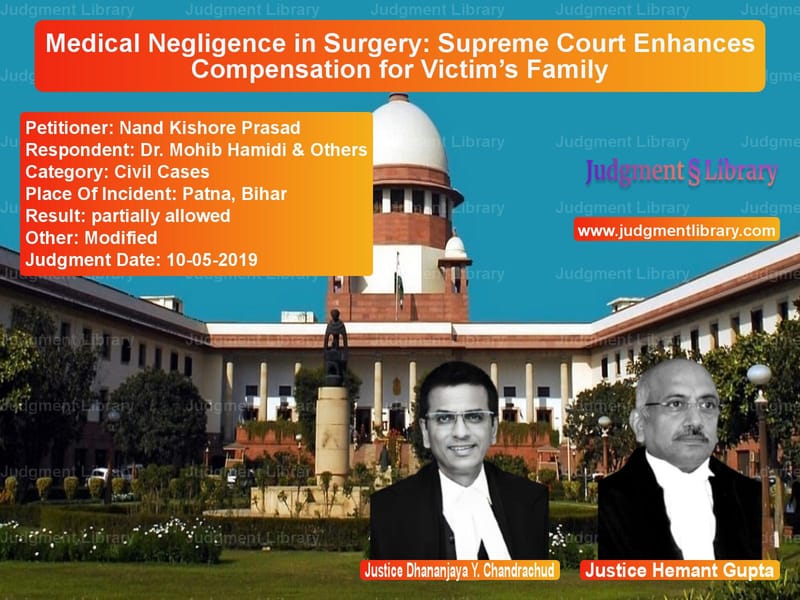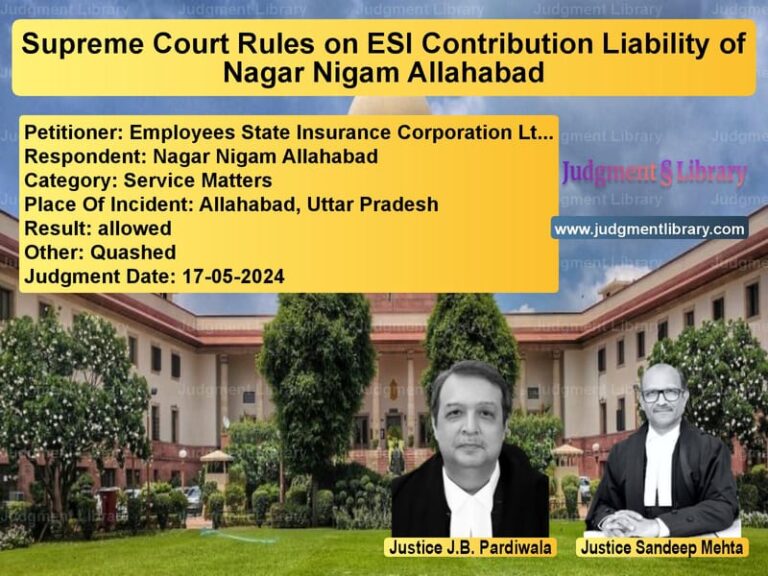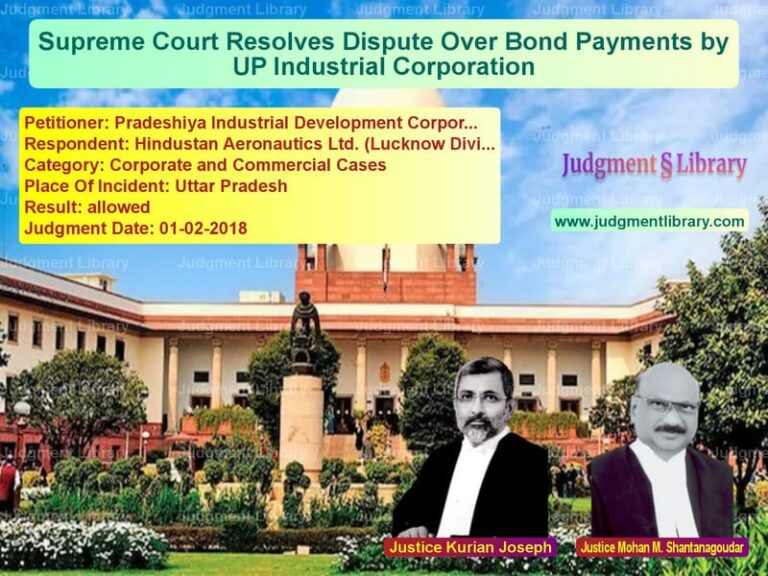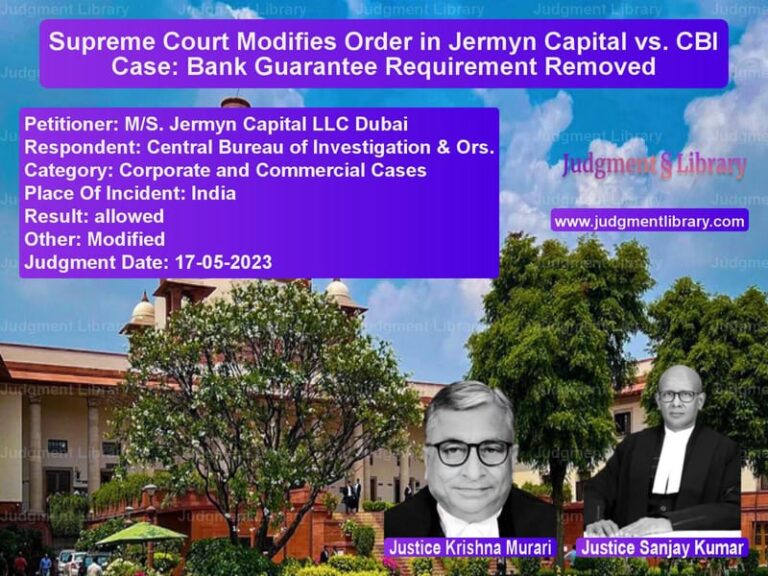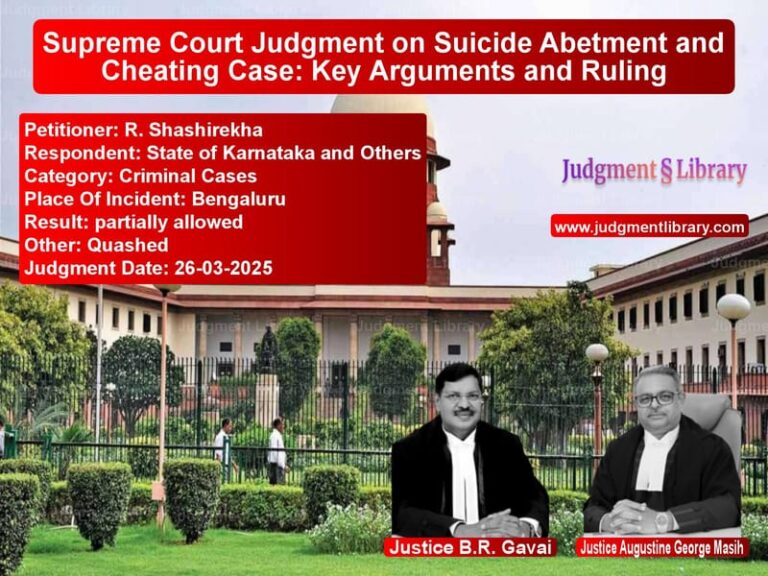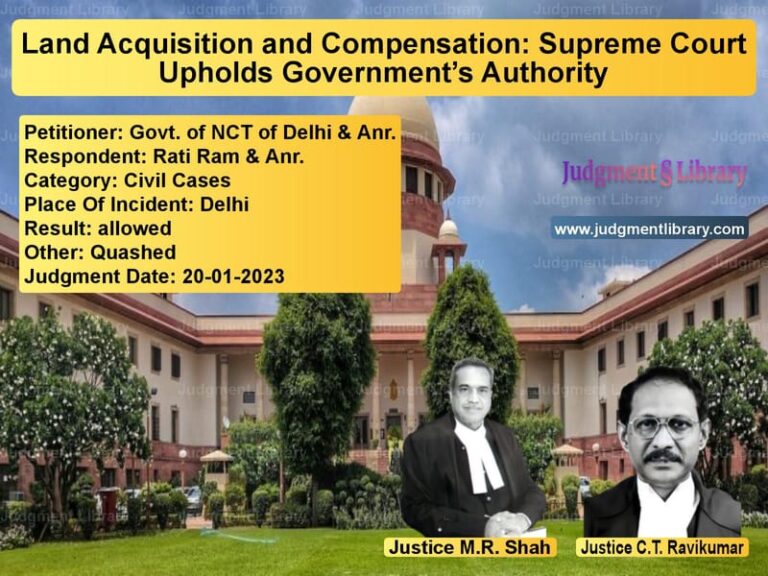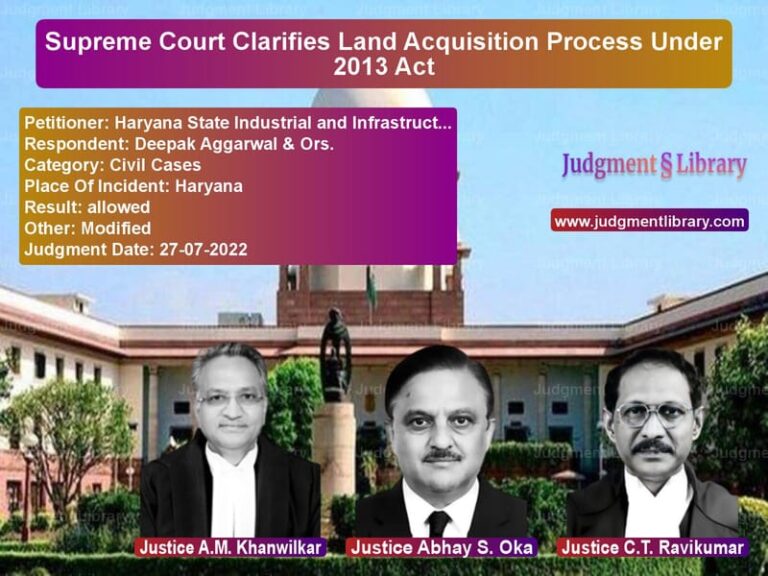Medical Negligence in Surgery: Supreme Court Enhances Compensation for Victim’s Family
The Supreme Court of India, in the case of Nand Kishore Prasad vs. Dr. Mohib Hamidi & Others, ruled on a tragic case of alleged medical negligence that led to the death of a 15-year-old boy. The Court found the operating surgeon guilty of medical negligence for performing surgery despite the patient having a critically low platelet count, thereby aggravating his condition. The Supreme Court partially allowed the appeal and directed an enhanced compensation to be paid to the deceased’s family.
The ruling is significant in defining the responsibilities of medical professionals in ensuring patient safety and assessing the necessity of surgical interventions, particularly in critical cases.
Background of the Case
The case arose from the death of Sanjay Kumar, a 15-year-old boy who was admitted to Kurji Holy Family Hospital, Patna, on November 10, 1995. He was suffering from fever, abdominal pain, and hemorrhages in both eyes. The hospital’s medical team decided to perform surgery the next day, despite the patient having a platelet count of only 35,000 per cubic millimeter, which was dangerously low compared to the normal range of 1.5 lakh to 4 lakh per cubic millimeter.
After surgery, the patient’s condition worsened, and his family took him to Patna Medical College and Hospital (PMCH), where he died on November 16, 1995. His father, Nand Kishore Prasad, filed a complaint with the State Consumer Disputes Redressal Commission (SCDRC), alleging gross medical negligence by the operating surgeon, Dr. Mohib Hamidi.
Legal Issues in the Case
The Supreme Court examined the following legal issues:
- Was the decision to operate despite low platelet count medically justified?
- Did the surgeon exhibit negligence by failing to consider alternative treatments?
- Should the operating surgeon be held personally liable for compensation?
- Is the hospital vicariously liable for the actions of its employee?
- What should be the appropriate amount of compensation for the victim’s family?
Arguments by the Appellant (Nand Kishore Prasad)
The appellant, father of the deceased, contended:
- The surgeon was negligent in performing surgery despite knowing that the patient had an extremely low platelet count.
- There was no emergency requiring immediate surgery; instead, alternative treatments should have been explored.
- The surgeon and hospital should be held accountable for wrongful death.
- The compensation awarded by the National Consumer Disputes Redressal Commission (NCDRC) was inadequate.
Arguments by the Respondents (Dr. Mohib Hamidi & Kurji Holy Family Hospital)
The respondents countered:
- The patient was admitted in a critical condition, and surgery was the only available option.
- The decision to operate was taken in good faith to save the patient’s life.
- Platelet transfusions were performed before and after the surgery.
- There was no intention of medical negligence, and the surgeon should not be personally held liable.
Supreme Court’s Key Observations
The Supreme Court carefully analyzed the evidence and medical reports before making the following observations:
1. Performing Surgery Was an Unreasonable Decision
- The Court found that the patient was in a critical state due to his low platelet count and pre-existing hemorrhage.
- There was no medical emergency that necessitated immediate surgery.
- The surgeon failed to consider whether non-surgical interventions could have stabilized the patient.
2. Failure to Prove That Surgery Was the Only Option
- The medical records did not indicate that the surgery was a life-saving measure at that stage.
- The surgeon did not justify why the risk of excessive bleeding was ignored.
- The post-operative medical notes did not mention any improvement in the patient’s condition.
3. Holding the Surgeon Accountable
- The Court found the surgeon’s decision to operate to be medically unreasonable.
- The NCDRC had earlier held the surgeon only “a bit negligent” but absolved him of monetary liability. The Supreme Court rejected this finding.
4. Hospital’s Vicarious Liability
- The hospital was held accountable for the negligence of its employed surgeon.
- Since the surgery was performed in its facility, the hospital had a duty to ensure appropriate medical care.
Final Judgment
The Supreme Court ruled:
- The operating surgeon was negligent in performing surgery without proper medical justification.
- The compensation amount was enhanced to ₹6,00,000, to be paid by Kurji Holy Family Hospital.
- An additional compensation of ₹2,00,000 was to be paid by the hospital within 12 weeks with interest at 6% per annum.
- The surgeon was warned to exercise greater caution in the future.
Implications of the Judgment
This ruling has several important implications for medical negligence cases:
1. Strengthening Accountability in Medical Decisions
- The judgment reinforces the principle that doctors must exercise due caution before performing high-risk surgeries.
- Unnecessary surgical interventions can lead to severe legal consequences.
2. Vicarious Liability of Hospitals
- The ruling clarifies that hospitals can be held responsible for the negligent acts of their doctors.
- It serves as a warning to medical institutions to enforce stricter supervision over surgical procedures.
3. Enhanced Compensation in Medical Negligence Cases
- The judgment sets a precedent for awarding higher compensation in cases of wrongful death due to medical negligence.
- Future claimants may refer to this ruling for fair compensation in similar cases.
Conclusion
The Supreme Court’s decision in Nand Kishore Prasad vs. Dr. Mohib Hamidi & Others underscores the importance of responsible medical decision-making. By holding the surgeon and hospital accountable, the ruling ensures that medical negligence does not go unchecked. It serves as a reminder to healthcare professionals that reckless surgical interventions without proper medical justification can have severe legal and financial consequences.
Petitioner Name: Nand Kishore Prasad.Respondent Name: Dr. Mohib Hamidi & Others.Judgment By: Justice Dhananjaya Y. Chandrachud, Justice Hemant Gupta.Place Of Incident: Patna, Bihar.Judgment Date: 10-05-2019.
Don’t miss out on the full details! Download the complete judgment in PDF format below and gain valuable insights instantly!
Download Judgment: Nand Kishore Prasad vs Dr. Mohib Hamidi & O Supreme Court of India Judgment Dated 10-05-2019.pdf
Direct Downlaod Judgment: Direct downlaod this Judgment
See all petitions in Medical Malpractice
See all petitions in Legal Malpractice
See all petitions in Contempt Of Court cases
See all petitions in Judgment by Dhananjaya Y Chandrachud
See all petitions in Judgment by Hemant Gupta
See all petitions in partially allowed
See all petitions in Modified
See all petitions in supreme court of India judgments May 2019
See all petitions in 2019 judgments
See all posts in Civil Cases Category
See all allowed petitions in Civil Cases Category
See all Dismissed petitions in Civil Cases Category
See all partially allowed petitions in Civil Cases Category

